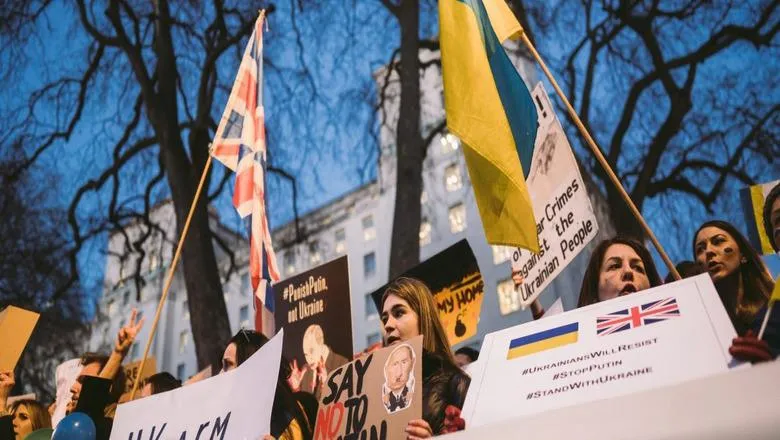Russia successfully insulated itself from sanctions following its illegal invasion of Ukraine. For economic deterrence to succeed, allies must learn from the experience.

The use of sanctions to constrain and compel adversaries during war is well documented. Far less attention has been devoted to using sanctions to deter conflict in the first place.
This changed in late 2021, when Russian forces amassed on Ukraine's border.
The US and UK coordinated a western effort to deter Moscow from invading its neighbour. While Washington and London held little hope of success, the centrepiece of this deterrence effort was the threat to impose unprecedented economic sanctions if Russia invaded.
The threat of unprecedented economic sanctions
Should Russia follow the path of confrontation when it comes to Ukraine, we've made clear that we will respond resolutely, including with a range of high-impact economic measures that we have refrained from pursuing in the past.
US Secretary of State Antony Blinken, 1 December 2021.
Since Moscow's full-scale invasion on 24 February 2022, western sanctions have been imposed on a wide range of economic activities. They seek to reduce Russia's revenues from energy and mineral exports; to constrain its acquisition of technology and finance; and to undermine the fighting ability of the Russian war machine.
The sanctions have been punitive, in the sense of following through on the threat made before the invasion, while also seeking to change Russian behaviour.
In the months running up to 24 February 2022, the threat of severe economic consequences was communicated to Moscow on multiple occasions, in private and public, by American, British and other western officials. At the time, the media reported that sanctions being considered included cutting off Russia's financial institutions from global transactions (through SWIFT) and banning the export to Russia of technology and components for use in the aerospace, defence and consumer sectors. It was reported that prohibiting 'the export of any consumer goods to Russia' was also being considered, including products containing American produced or designed electronics.
The threat of sanctions was accompanied by other dissuasive messaging. Russian military officials were warned that their forces would get bogged down in an insurgency if they failed to achieve a rapid victory, that western military assistance to Ukraine would be increased and that NATO's force posture in Eastern Europe would be enhanced. The US and UK also engaged in the unprecedented declassification of intelligence to highlight Russia's intentions.
The failure of deterrence
The effort to deter Russia's invasion ultimately failed. Several factors help to explain this failure. All highlight the importance of context when seeking to use the threat of economic sanctions to deter.
First, the threatened western sanctions were ambiguous prior to 24 February. There were questions over how far different western countries would be prepared to go - for example in imposing sanctions on gas and oil exports - particularly given many European countries' reliance on Russian energy supplies.
Second, the west's response to Russian aggression in Crimea and the Donbas in 2014 may have convinced Putin he was in a position to weather any sanctions imposed by a full-scale invasion. The response in 2014 included imposing an arms embargo, restricting equipment exports to the oil industry, denying Russian state-owned banks access to European capital markets, and imposing travel bans and asset freezes on those involved in the Ukrainian action, but did not target the trade in oil, gas or other commodities from Russia.
Third, Moscow took measures after 2014 to reduce Russia's vulnerability to sanctions, including its reliance on the global financial system. This 'Fortress Russia' approach grew the country's foreign currency reserves, accumulated surplus revenue from oil and gas sales in a National Wealth Fund, reduced dependency on foreign investment, and established a Finance Ministry unit to counter sanctions. Russia believed that expanding engagement with other markets such as China could offset western pressure. Russian Finance Minister Anton Siluanov remarked in January 2022, 'Obviously, it's unpleasant, but it's do-able. I think our financial institutions can handle it [if] these risks emerge'.
Fourth, prior to the invasion, western countries including the United States were quick to rule out military involvement to help Ukraine in the event of a further Russian attack. This was done to avoid the potential for escalation with a nuclear-armed power. Beyond escalating sanctions, this made clear to Putin that there were significant limits to what the US and its allies were prepared to do in defence of Ukraine.
Fifth, President Putin seems to have held a set of beliefs and assumptions which, if accurate, suggest he may not have been deterrable at all. These include his longstanding imperial nationalist worldview, a desire to bring western-leaning Ukraine to heel and 'maintain primacy in the former Soviet Republics on Russia's periphery', and an approach to governance that manufactures external threats as a means of enhancing domestic political support.
It is worth noting that Putin seriously underestimated the extent to which western states would unite in opposing the invasion. As well as providing military assistance, Europe has demonstrated a readiness to suffer significant economic discomfort from the imposition of sanctions targeting Russian energy exports. Russian Foreign Minister Sergei Lavrov has admitted that the scale of the sanctions took Moscow by surprise.
Lessons for sanctions and deterrence
Allies can learn a lot from the experience with Russia.
The pre-war effort to deter Moscow enabled the US, EU and G7 to coordinate a rapid and robust programme of economic sanctions immediately following the invasion. These measures sought to punish Moscow for the invasion, and to compel Russia to change course. These sanctions have expanded and diversified over the course of the war.
Going forward, however, it is important to contemplate how deterrence posturing and statements related to the imposition of sanctions might influence any downstream efforts to punish and compel if deterrence fails.
The threat of sanctions was not articulated in a detailed manner prior to 24 February. Whether this was because of a lack of cohesion among western actors or because of a desire to maintain an element of ambiguity is unclear. Careful thought is required on how to signal the threat of economic sanctions as part of any future deterrence strategy. This includes how specific to be about the types of economic sanctions that will be imposed. The political context will always set the conditions for building a coalition of actors capable of credibly communicating the requisite resolve and capability as part of deterrence.
The unprecedented scope and scale of the sanctions actually imposed on Russia since the invasion may have a secondary deterrent effect on other adversaries. Unfortunately, however, the 'Fortress Russia' model is not limited to Russia. Similar approaches are being pursued by China and Iran. This includes efforts to reduce financial vulnerability and reliance on the US dollar.
Russia has shifted the focus of its oil exports to China and India, which now account for some 90% of oil exports, and established a network of oil shippers to get around the G7 'oil cap' restrictions of US$60 per barrel. Russia has expropriated foreign assets and reduced its reliance on western supply chains, including procuring sanctioned items via 'complex supply chains and alternative supply routes'. Machine tool imports from China have increased tenfold. Russia is also importing around US$900m of battlefield and dual-use technology each month.
The UK published a new sanctions strategy in February 2024 placing an emphasis on the role of sanctions to deter malign activity, to disrupt it and to demonstrate a readiness to defend international norms. If this strategy is to be effective, the UK and its allies must learn from recent experience and adapt to efforts of states like Russia to work around economic sanctions.
This paper is from a new series of articles from the London Defence Conference 2024.








